Growing Bamboo in Pots? Yes! You heard it right! It can be planted in containers as well! Learn the process in the article below!
Bamboo (Bambuseae spp) is categorized as perennial grass. It grows quickly and doesn’t require much maintenance. Some varieties of the bamboo plant are invasive and can spread vigorously from underground rhizomes in your garden. Thus, you can control the growth by planting it in containers. Read the article on Growing Bamboo in Pots!
Check out our article on the best fertilizer for bamboo here!
Growing Bamboo in Pots
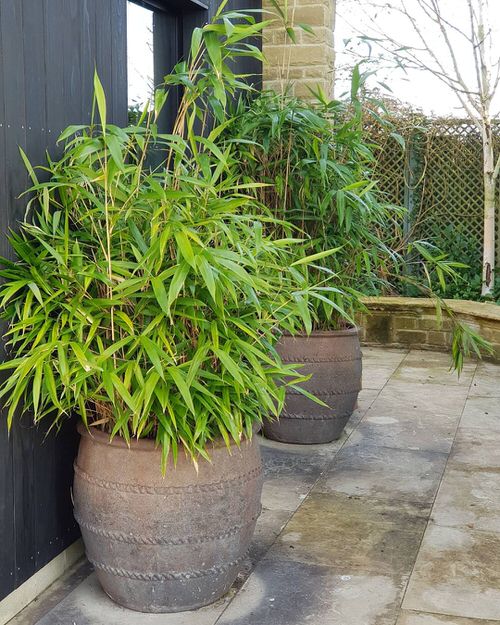
Bamboo plants are divided into two main types: Running and Clumping. The running ones are invasive and spread throughout the garden if not controlled, whereas clumping ones grow at a slower pace, which is why it is better to grow them in pots.
While growing bamboo in pots, do bear in mind that while repotting, you need to be sure of the growth patterns, as they are different and diverse. Bamboo grows fast, and if you leave it in the same pot for a longer period, it is going to turn root-bound and fragile, dying ultimately.
Some of the best varieties that you can grow in containers are Seabreeze, Multiplex Hedge, Fargesia, and Buddha Belly.
Tip: As the running bamboo turns root bound rapidly, hence provide sufficient space to its roots.
To know whether you can eat bamboo or not, click here!
Container Size for Bamboo
Choose a large container with proper drainage holes. The size of the pot must be at least 18-20 inches deep and wide similarly or more in diameter. You must have to thin potted bamboo plants regularly to keep their spread in check.
Check out some amazing bamboo projects for the garden here!
Requirements for Growing Bamboo Plants
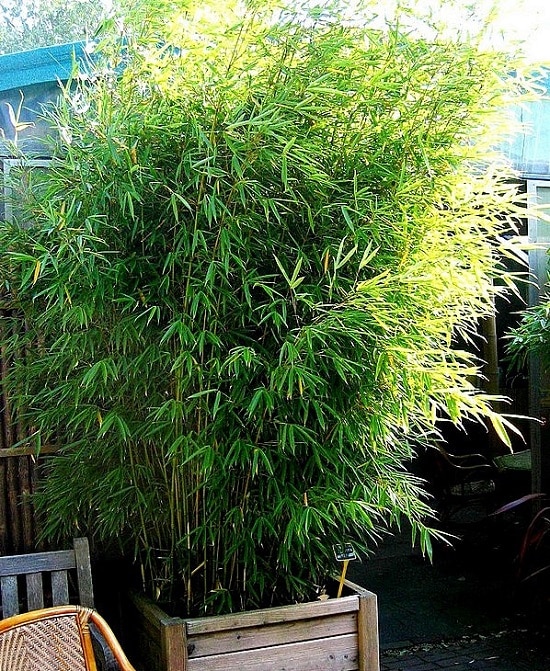
Soil
Using the right potting soil is the most important step for getting a healthy, dense foliage plant. Bamboo flourishes in moist, loamy soil that is slightly acidic in nature.
To improve drainage, add a thin layer of sand at the base of the pot. Make sure that your container has sufficient bottom holes to prevent waterlogging while growing bamboo in pots.
Water
As bamboo prefers slightly moist soil, water it twice a week, and increase the quantity if the air is dry and hot. To check, poke your finger, in 2 inches in the topsoil. If you see it dry, then its time to water the plant.
Tip: If you notice leaves are turning inward, then it is a sign that your plant needs water.
Light
Bamboos can grow both in full to partial sun. Varieties like Sasa and Thamnocalamus can thrive well in partial shade, mainly in hot days.
Huge varieties like the giant bamboo need 5-6 hours of direct, full sunlight to grow well. Silverstripe bamboo comes under a clumping variety and thrives well in both full to partial shade.
Pruning
Do not prune any canes during the first year of growing bamboo in pots, as it is going to help the plant in taking more food and energy. After that, in the coming second and third-year, snip off the short and weak foliage.
Prune the plant in early fall or late summer and cut the unhealthy or dead culms during spring, to maintain the shape and health. If you intend to reduce the height, then cut it over the node.
- Remove new shoots of clumping bamboo, as it grows by tiny clumps near the established plant. Use a trowel to pull them out.
Tip: Before pruning, use a high nitrogen fertilizer.
Thining
If you notice roots emerging above the soil, use a trowel to pull them out. Removing a few roots will help the plant in receiving air and water.
Tip: Only pull out 25 percent or fewer roots, as removing more than this in a single pruning session, may hurt the plant.
Pests and Diseases

Bamboos are strong and resilient plants, but they may get spots and discolor sometimes. Diseases like sooty mold, rot issues, and bamboo mosaic virus also interrupts the plant growth.
- While growing bamboo in pots, they may get affected by fungal spots in humid conditions. You can use a copper-based fungicide to treat the same.
- Make sure to sterilize the pruning shears to avoid the mosaic virus.
- If you notice mealybugs, aphids, and scale, wash the plant with a strong spray of water.
- Rotting issues like heart rot, stay inside and moves to any part of the stem; on the other hand, root rot impacts the roots and base of the stem. Keep in mind that these kinds of diseases can not be cured as they kill the plant. Hence to prevent the disease from spreading, eliminate the rotted plants.
Bamboo in Pots Uses
1. On a Large Patio
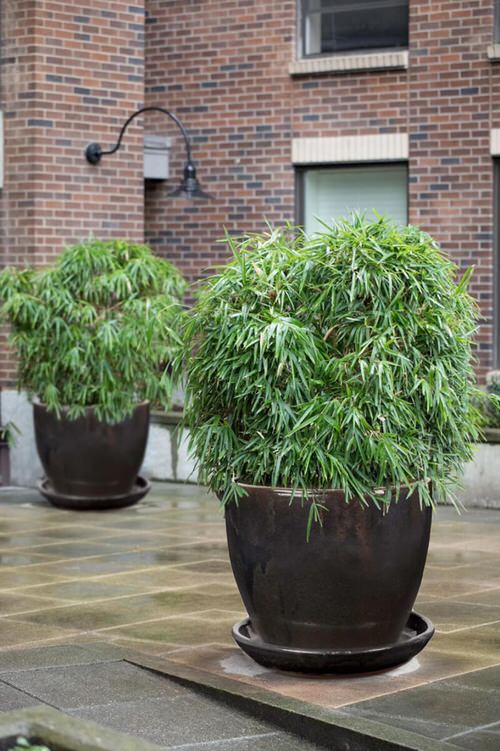
Potted bamboos are one of the best ways to bring a lavish green look to a patio.
2. A Relaxing Corner
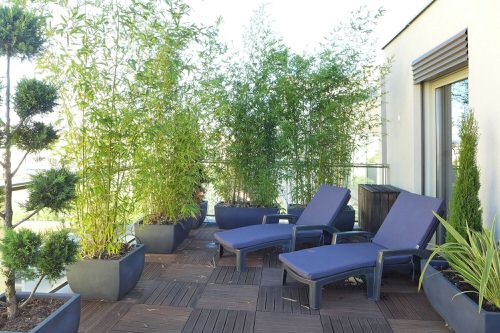
A group of potted bamboos is all you need to make a corner green where you can sit and relax.
3. A Privacy Screen
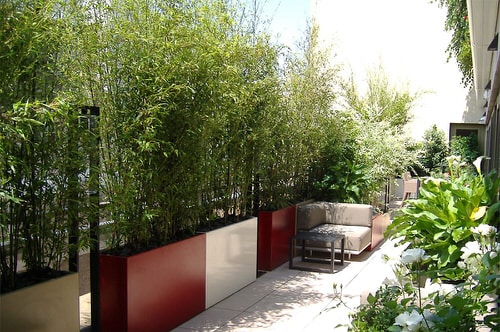
Want to keep it a little private? Grow bamboos in large containers and make a green privacy screen!
4. A Tropical Feel
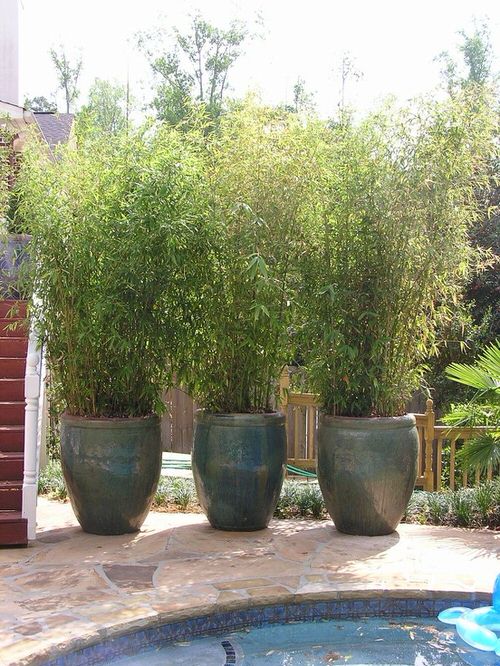
Lining up potted bamboos by the pool will bring a beachy and tropical vibe to the place.
5. Decking Up the Walls
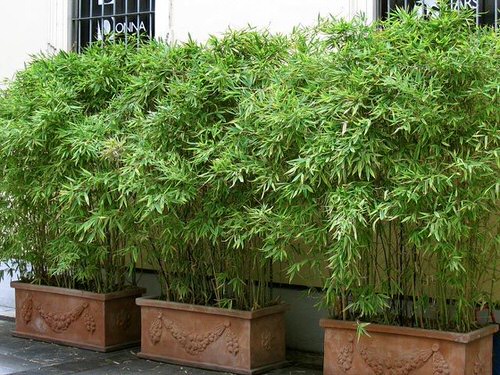
Want to cover a bland wall? All you have to do is to grow bamboos in large containers!



I think my bamboo is dying ,it is in a pot but it is going really baldy .
My potted bamboo plants were also looking pretty bad at the end of the winter (potted fargesia bamboo). I think it’s because I wasn’t watering them during the winter and we had a rather dry winter. I read that you should water potted bamboo during the winter because they can dry out easily. Then in March, I cut out the bad-looking stems and trimmed away some of the brown leaf tips and gave them high-nitrogen fertilizer (meant for bamboos — bought on amazon) and now they are looking beautiful and lush again and are growing like crazy. They do need watered often but do not like very soggy soil. I also give them a mist with the hose sometimes and they seem to like that, to keep their leaves hydrated. I hope yours can be saved, too. :)
I live in Wiltshire u.k. it’s cold in winter but it’s not Canada -5 at worst what bamboos should I grow in containers for privacy like ten foot?
Hi can I send you a photo of the area I need privatisation